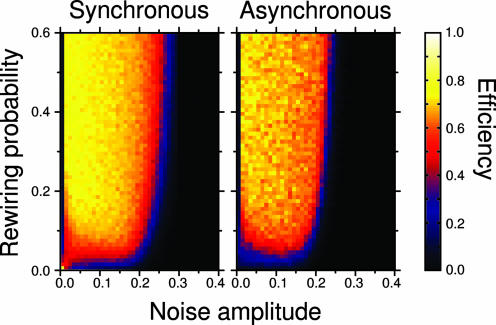Fig. 2.
Efficiency of the GKL rule in performing the density-classification task for different updating schemes. We systematically investigate the efficiency of systems under different intensities of noise and rewiring probability. When all units update their states synchronously, we find the highest efficiency when p = 0 and η = 0. If η = 0 and p ≠ 0 or η ≠ 0 and p = 0, then the efficiency of the GKL rule decreases dramatically. An efficiency of ≈0.75 is achieved for a large range of parameter values when both noise and rewiring are present. In this regime, the GKL rule performs as a sort of majority rule. It is significant that when using asynchronous update the system is not in the efficient regime when p = 0 and η = 0. These results confirm that the GKL is not a robust rule, i.e., is a rule optimized for very restrictive conditions.

